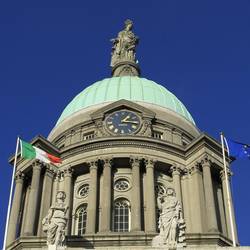IRISH Catholic Group Puts Pressure on Government to Reopen Embassy to the Holy See
By Gerard O'Connell
The Irish Government is coming under pressure from a broadly based Catholic lay group, with support from members of different political parties, to re-open its Embassy to the Holy See. On January 18, more than a hundred members of the Group, known as Ireland Stand Up, met for five hours with one-third of the members of the Irish parliament. 50 of the 166 members of parliament’s lower house (the Dail) and 25 of the 60 members of its upper house (the Seanad) were present. Even more significant was the presence of the Junior Minister of the Department of Foreign Affairs (DFA), Lucinda Creighton, together with representatives of the Taoiseach (Prime Minister) and several other ministers, as well as Ireland’s new ambassador to the Holy See, David Cooney, who is also Secretary General of the DFA. Their presence was a clear sign that the coalition Government is taking this campaign seriously, according to political commentators. On 3 November 2011, the Dublin Government announced its decision to close the Embassy to the Holy See and appoint a non-resident ambassador as its diplomatic representative there, for the first time in 81 years. It said it was doing so ‘for economic reasons’, but many believe the rationale was more political than economic. Soon after, a number of Catholic lay people started a Group, known as Ireland Stand Up, to campaign for the re-opening of the embassy. Mary E. Fitzgibbon, the Group’s spokesperson, said the campaign was inspired by a Dublin mother who was offended by the embassy closure. The Group, using the social and other media, is urging people across the country to write to the Government asking it to reverse its decision, to re-open the embassy, and to invite Pope Benedict XVI to the International Eucharistic Congress in Dublin, next June. More than 15,000 people have so far written to the government, it said. At the meeting in Dublin, widely reported in the Irish media, Ms. Fitzgibbon traced the history of Ireland’s relations with the Holy See from the year 432 when Pope Celestine I sent Saint Patrick to the country to the founding of the Irish State, and the establishment of diplomatic relations in 1929. “We do not believe the decision was economic”, she stated. Significantly, Colm Keaveney, a parliamentary member of the Labour Party (one of the coalition partners in government) agreed. “I personally believe we can afford it,” he said. Another parliamentarian, Brian O’Domnhaill, of the main opposition party, Fianna Fail, asked why the Government had chosen to close its embassy to the Holy See rather than the one to Malawi. Responding for the Government, Lucinda Creighton, the Junior Minister, said an Irish diplomatic presence to the Holy See “is very important, not just for Catholics in Ireland, but for the Department of Foreign Affairs’ strategy”. "Our foreign policy agenda is at one with the Vatican. When it comes to the priorities for us, human rights, hunger, all of these freedoms that we promote all over the world, particularly in Africa, we do it hand in hand, side by side with the Vatican”, she stated, according to a report in The Irish Examiner. "From a strictly foreign affairs perspective”, she said, “I think it would be very desirable in the future to step up our relations with the Vatican again. Now is obviously not going to be possible, but certainly in due course.” When that time comes, she added, “I’ll certainly be one of the loud voices calling for it to happen." Speaking to Ireland’s RTE television afterwards, Ms. Fitzgibbon expressed the campaigners’ satisfaction at the outcome of the meeting. “I think they are taking it very seriously. They were very much open to dialogue”, she said. She revealed that the parliamentarians had invited the Group to speak to the Foreign Affairs Committee of the Irish Parliament.
|
.
Any original material on these pages is copyright © BishopAccountability.org 2004. Reproduce freely with attribution.
